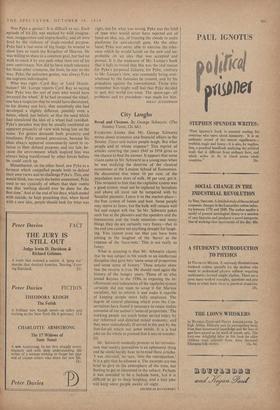City Laughs
EVERYONE knows that Mr. George Schwartz writes about economic and financial affairs in the Sunday Times and makes people laugh. But what people and at whose expense? This reprint of articles covering the years 1945 to 1958 gives us the chance to find the answer. It appears that some vision came to Mr. Schwartz as a young man when he was studying the doctrine of the classical• economists at the London School of Economics. He discovered that when 10 per cent, of the population went short of milk, 90 per cent, got it. This revealed to him that the capitalist system was a good system, must not be replaced by Socialism and above all must not be tampered with by Socialist planners. Leave it to the market-place- the free system of boom and bust. Some people may starve at times, but the bulk will remain well fed and output will rise. So Mr. Schwartz pokes such fun at the planners and the spenders and the bureaucrats and the trade unionists—and many things they do are certainly very funny—that in the end you cannot see anything straight for laugh- ing. You cannot even see that you have been joining in the laughter of the 'haves' at the expense of the 'have-nots.' This is not really so funny.
What is amazing is that Mr. Schwartz claims that he was subject in his youth to an intellectual discipline that gave him 'some sense of proportion and some sense of history.' These articles show that the reverse is true. He should read again the history of the hungry years. Those of us who joined Keynes in the 1930s in exposing the in- efficiencies and indecencies of the capitalist system certainly did not want to scrap it for Marxist socialitm, but to reform it and make it capable of keeping people more fully employed. The degree of central planning which even the Con- servatives have found it necessary to retain makes nonsense of our author's (sense of proportion.' The working people are much better served today by our reformed and directed mixed economy, and they were undoubtedly ill served in the past by the free-for-all which our jester extols. It is a bad joke on the whole to pretend that it was so wonder- ful.
Mr. Schwartz modestly protests in his introduc- tion that weekly journalism is an ephemeral thing and he could hardly bear to re-read these articles. 'I was chivvied,' he says, 'into the reproduction.' It is a pity that he allowed it. The excerpts are too brief to give us the atmosphere of the time, too fleeting to get us interested in the subject. Perhaps it was intended to be a bedside book, but it is difficult to go to sleep laughing, and a bad joke will keep some people awake all night.
NICHOLAS DAVLNPOR










































 Previous page
Previous page